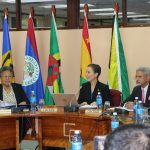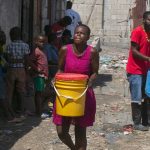Post-COVID-19 Challenges Prompt Rethinking of Approach to Census-Taking

The difficulties being encountered in administering the 2020 Round of Population and Housing Census have prompted a re-examination of the approach to census-taking in the Caribbean Community.
The current approach of mainly face-to-face interviewing may not be sustainable in the long-term and this will mean investment in innovative and creative means of census-taking.
CARICOM Director of Regional Statistics, Mr. Halim Brizan, made the observations during remarks on Wednesday, 19 April, at the opening of the Integrated Geospatial Information Framework (IGIF) Workshop in Saint Lucia.
“We are beginning to realise that in a post-COVID environment our current approach and mode of operation (face-to-face interviewing) may not be sustainable in the long-term and we have to find and invest in new, innovative and creative means of making census-taking easier and effective.
“It is therefore important that we start planning early for the subsequent census rounds by developing the structure for multimodal censuses as well as strengthening, linking and utilising our administrative sources as highlighted in the fundamental principles of official statistics to reduce cost, respondent fatigue and improve timeliness,” Mr. Brizan said.

The COVID-19 pandemic delayed the start of the 2020 Round of Census in the Caribbean with the Region launching its Census exercises on 3 August 2021. To offset the realities of the pandemic, the Region initiated the use of Computer Assisted Personal Interviewing or some hybrid, including paper questionnaires, Computer Assisted Telephone Interviewing and Computer Assisted Web Interviewing.
Mr. Brizan pointed out that the implementation of the IGIF is important as it would present opportunities by using GIS and assuring greater collaboration and integration among key stakeholders but warned that it must be country-owned and country-led.
The three-day workshop focuses on the implementation of the IGIF in the Caribbean. With support from the 11th European Development Fund, the Secretariat is partnering with the Organisation of Eastern Caribbean States (OECS) Commission and the Economic Commission for Latin America and the Caribbean (ECLAC) to host the event.
“This is an important undertaking for us at the CARICOM Secretariat as its implementation can advance our mandate to contribute to the improvement of the quality of life of the people of the Community,” the Regional Statistics Director said. He added that it will also lead to the development of an innovative and productive society in partnership with institutions and groups working to attain a people-centered, sustainable and internationally competitive Community.
He said he hopes the initiative will eventually lead to the production of interoperable, high quality and timely geospatial information and analysis, which is globally recognised as the prerequisite for good policymaking.
“Its importance in the sustainable development thrust is even heightened for Small Island Developing States, especially our CARICOM states, who are faced with specific and increasing challenges due to their geographic characteristics, remoteness, small landmass, small populations, small economies, high exposure to external environmental and economic shocks and the climate crisis,” he said.
The IGIF dovetails with the goals of the Regional Strategy for the Development of Statistics (RSDS) and there are opportunities to exploit, adopt and advance in the establishment of a cohesive, coherent architecture to produce, process and disseminate methodically sound statistics. One of the strategic drivers for both the RSDS and the IGIF is the 2030 Agenda for Sustainable Development and Small Island Developing States Accelerated Modalities of Action (the SAMOA Pathway).
Source: CARICOM TODAY

 Previous Post
Previous Post Next Post
Next Post